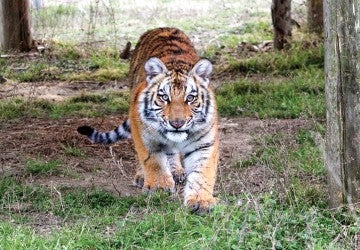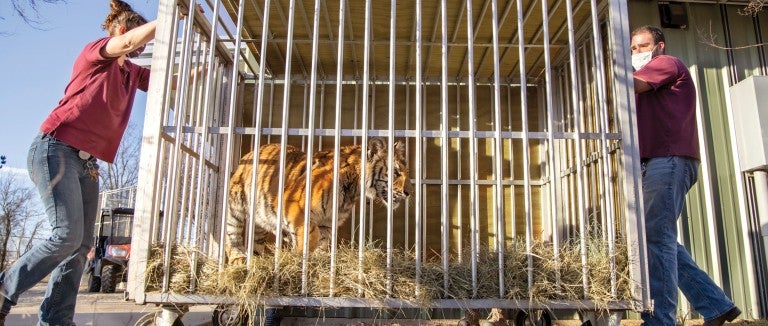Just as a historic freeze sent temperatures plummeting in Texas in February, overwhelming the state’s power grid, breaking pipes and leaving roads slick with ice, a strange call came into the Bexar County Sheriff’s Office near San Antonio. Someone said they heard an animal crying outside their neighbor’s home. Deputies discovered a 6-month-old, 75-pound tiger in a cage, wearing a leash and a harness. She had rubbed her forehead raw on the bars and didn’t have enough straw to stay warm. Deputies seized the tiger under a county law that makes owning big cats a misdemeanor. They named her Elsa, after the character in Disney’s Frozen films.
Two hundred and eighty miles to the north, the staff at Cleveland Amory Black Beauty Ranch were also dealing with the abnormally cold weather, spending nights at the sanctuary so they could run generators to cope with rolling power outages and tend propane heaters that kept primates and reptiles alive. When director Noelle Almrud got the call about Elsa, she offered to give the juvenile tiger a home at the sanctuary, operated by the Fund for Animals, an affiliate of the Humane Society of the United States. Then she waited for the roads to thaw.
The next week Elsa arrived at the sanctuary, where she spent her first 30 days in a small quarantine yard. Caretaker Christi Gilbreth put her on a diet of red meat and vitamin supplements. Like most “pet” tigers, Elsa had probably been fed only chicken, which doesn’t provide the proper nutrients for a big cat and can cause bone spurs, osteoporosis, tiny fractures and arthritis and other joint problems.
As Elsa investigated her surroundings, she spied a resident tiger in an adjoining enclosure. It was likely her first time seeing another tiger. Four-year-old Loki came to Black Beauty Ranch in 2019, after being rescued from a cage in a Houston garage. Four times Elsa’s size, he returned her stare.
In the wild, tigers lead solitary lives. But Gilbreth gives Elsa the human attention she is probably used to. When Elsa naps at the chain-link fence, Gilbreth sits on the other side. There are also periods when Elsa is alone. “What we want her to be is just a tiger,” Gilbreth says. “What we want her to be is what she was meant to be.”

Now Elsa is an increasingly confident juvenile who’s growing into her three-quarter-of-an-acre adult yard, with trees and climbing platform, waterfall and pool.
Tiger cubs are easy to get in the U.S., where people breed them so businesses can charge customers to pet and pose for photos with baby tigers. In Texas, many local jurisdictions in rural areas allow individuals to own tigers and other animals with a permit, says HSUS state director Lauren Loney. But cubs quickly grow to 400-pound animals who can kill a person with a playful swipe or pounce. And they frequently are neglected, abandoned or even shot and left on the side of the road.
Some states have outlawed the sale and ownership of tigers and other big cats. The HSUS is trying to get a similar law passed in Texas. There is bipartisan support in the state Senate, but opposition in the House has so far blocked the bill. The HSUS also supports the Big Cat Public Safety Act, a federal bill that would end tiger cub petting and public contact with wild animals.
March brought another sign Texas needs to act: Bexar County sheriff’s deputies seized two big cats from inside a home south of San Antonio—a baby tiger and a bobcat. There was also good news: Elsa’s owner failed to show up for a court hearing, and the judge took custody of the tiger away from her. At Black Beauty Ranch, Elsa’s expected to live out a long life, not as a pet, but as a tiger.
Ask your members of Congress to support the Big Cat Public Safety Act. Take Action
Want more content like this?
This was written and produced by the team behind All Animals, our award-winning magazine. Each issue is packed with inspiring stories about how we are changing the world for animals together.
Learn MoreSubscribe
